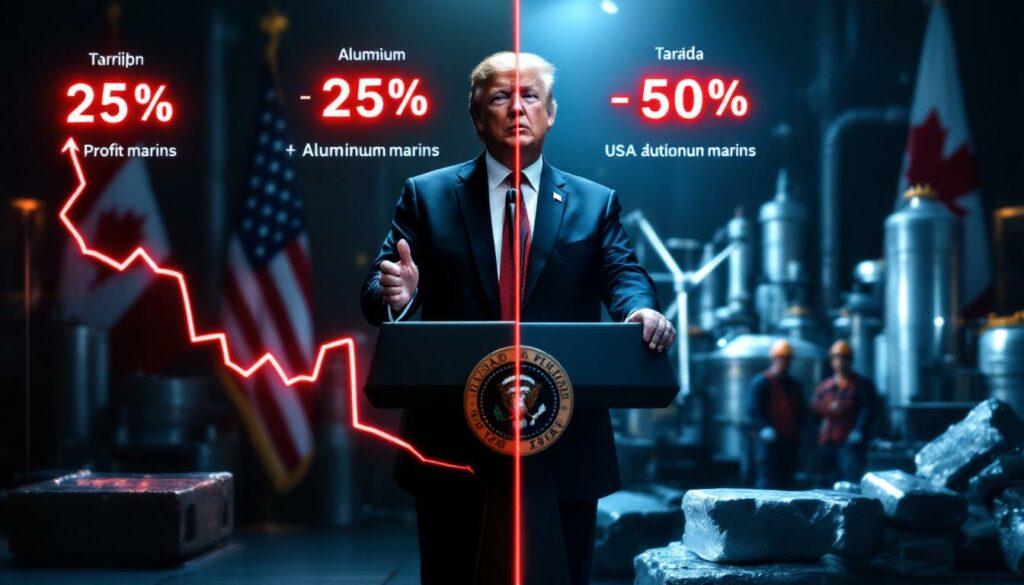How Are Trump's Aluminum Tariffs Affecting US Producers?
The recent implementation of aluminum tariffs by the Trump administration has created a challenging paradox for US-based producers with international operations. Despite being designed to boost American manufacturing, these tariffs impact on investments are now adversely affecting Alcoa, the largest US aluminum producer, forcing the company to pause growth projects in Canada and reconsider its operational strategy.
Alcoa's Canadian Operations Under Pressure
Alcoa, the Pittsburgh-based metals producer with significant operations in Quebec, is experiencing severe profitability issues at its Canadian facilities due to the tariffs. Bill Oplinger, CEO of Alcoa, has been direct about the impact: "The profitability of Quebec is severely impacted," forcing the company to put "all growth projects in Quebec on hold" as it navigates this uncertain trade environment.
The company's strategic position is particularly complicated as it operates three smelting and casting facilities in Quebec that have historically served American customers. This cross-border integration, once a competitive advantage, has become a significant liability under the new Trump tariff implications.
The Scale of Financial Impact
The financial burden of these tariffs has been substantial and quantifiable:
- Alcoa reported $115 million in additional tariff-related costs in Q2 2025 alone
- The company's three Quebec facilities now face dramatically altered economics
- Approximately 40% of Alcoa's Quebec-produced metal can potentially be diverted to non-US markets
- The remaining 60% faces significant tariff costs or complex supply chain restructuring
Alcoa isn't alone in feeling this pressure. Rio Tinto, another major player in the aluminum sector, reported over $300 million in tariff-related costs in the first half of 2025 due to its Canadian aluminum production. The company has already implemented a hiring freeze across its Quebec smelters, signaling broader industry impacts beyond Alcoa.
What Are the Current US Aluminum Tariffs?
The Trump administration has implemented a two-phase increase in aluminum tariffs that has dramatically altered the economics of cross-border metal trade, particularly affecting the deeply integrated North American supply chains.
Tariff Implementation Timeline
The current tariff structure has been implemented through a strategic escalation:
- March 2025: Initial tariff increase to 25%
- June 2025: Further increase to 50%
This rapid escalation has left aluminum producers with international operations scrambling to adjust their supply chains and business strategies. The doubling of tariffs within just three months has compressed the timeline for companies to develop mitigation strategies.
Industry-Wide Impact
The trade war market impact has created ripple effects throughout the aluminum industry:
- Rio Tinto: Reported over $300 million in tariff-related costs in the first half of 2025
- Employment effects: Rio Tinto has implemented a hiring freeze across its Quebec smelters
- Supply chain disruption: Companies are forced to reconsider longstanding customer relationships and logistics networks
- Market uncertainty: Producers face difficult decisions about capital investments and operational planning
The tariffs, while aimed at boosting American manufacturing, have created complex challenges for US-based multinational producers who have built integrated cross-border supply chains over decades.
How Is Alcoa Responding to the Tariffs?
Alcoa's management is implementing several strategies to mitigate the impact of the tariffs while awaiting potential resolution through trade negotiations. The company's approach balances immediate operational adjustments with longer-term strategic planning.
Immediate Response Strategies
Oplinger has outlined several tactical responses that Alcoa is pursuing:
- Rerouting shipments: "We're doing everything we possibly can to ship tons that are normally destined for the US to other parts of the world," Oplinger stated
- Market redirection: Focusing on European and Canadian customers for about 40% of Quebec production
- Capital investment freeze: All growth projects in Quebec have been put on hold pending tariff resolution
- Wait-and-see approach: Major strategic decisions deferred until after the August 1 negotiation deadline
These immediate responses aim to minimize the financial impact while preserving optionality for future strategic decisions.
Potential Future Actions
Beyond these immediate steps, Alcoa is considering several longer-term options if tariffs remain in place:
- Government support: Seeking Canadian federal and Quebec provincial assistance
- Supply chain restructuring: Considering alternative alumina sourcing outside Brazil to avoid potential additional tariffs there
- Strategic review: Evaluating the long-term viability of current operational footprint if tariffs become permanent
- August 1 deadline: Using the negotiation deadline for a new US-Canada economic and security deal as a key decision point
Oplinger emphasized that Alcoa is "waiting until August 1" before making any major strategic decisions about its Canadian operations, highlighting the importance of the ongoing trade negotiations.
What Are the Broader Implications for US-Canada Trade Relations?
The aluminum tariffs represent one facet of evolving trade tensions between the United States and Canada, with significant implications for both economies and their deeply integrated supply chains.
Current Negotiation Status
The tariff situation exists within a broader context of US-Canada trade negotiations:
- August 1, 2025: Critical deadline for a new economic and security agreement between the US and Canada
- Ongoing discussions about potential proposed tariff breaks or modifications to the tariff structure
- Uncertainty about whether sectoral exemptions might be possible even if broader agreement isn't reached
The outcome of these negotiations will determine not just the future of aluminum trade but potentially reshape broader economic relations between the two neighboring countries.
Potential Government Intervention
If tariffs remain in place, Alcoa may need to seek assistance from multiple government entities:
- Canadian federal government: Potential for national-level support programs or trade assistance
- Quebec provincial government: Provincial incentives or cost relief measures to maintain operations
- Policy coordination: Need for aligned responses across different levels of government
The possibility of government intervention highlights how tariffs can transform private sector business decisions into matters of public policy and international relations.
How Severe Is the Current Trade Uncertainty?
According to Oplinger, who has been with Alcoa for over 25 years, "This is easily the most extreme trade uncertainty we've seen." This statement from a veteran industry executive underscores the unprecedented nature of the current situation and the challenges it presents for international manufacturers with integrated cross-border operations.
Additional Tariff Concerns
Beyond the Canadian situation, Alcoa faces potential additional disruption from:
- Threatened 50% tariffs on Brazilian imports, where Alcoa sources alumina to feed US plants
- Compound effects of multiple tariffs across different parts of the supply chain
- Weakened overseas demand limiting options for redirecting shipments
- Logistical challenges in rapidly reconfiguring long-established supply routes
These layered uncertainties create a complex decision environment where companies must develop contingency plans for multiple potential scenarios while managing day-to-day operations under existing constraints.
What Does This Mean for the Aluminum Industry's Future?
The current tariff situation creates significant uncertainty for aluminum producers with international operations and integrated supply chains, potentially forcing fundamental reconsideration of business models that have developed over decades.
Long-Term Strategic Questions
The industry now faces several existential questions:
- Operational footprint: Will aluminum producers need to restructure their international operations to align with new trade realities?
- Supply chain resilience: How can companies design supply networks that can withstand commodity market volatility?
- Government relationships: What role will government support play in maintaining competitiveness in a protectionist environment?
- Investment horizons: How can companies make long-term capital decisions amid policy uncertainty?
These questions challenge fundamental assumptions that have guided industry development during the era of increasing global trade integration.
Industry Adaptation
Companies like Alcoa are being forced to:
- Reconsider capital investments and potentially delay growth opportunities
- Explore new market opportunities outside traditional customer bases
- Develop contingency plans for various trade scenarios with different levels of restriction
- Strengthen government relations to navigate policy complexities
- Potentially seek government assistance to maintain operations during transition periods
This adaptation process represents a significant management challenge that diverts resources from productivity and innovation toward regulatory and policy navigation.
FAQ: Understanding Aluminum Tariffs and Industry Impact
Why did the Trump administration implement aluminum tariffs?
The tariffs were implemented with the stated goal of boosting American manufacturing and protecting domestic producers from international competition. However, the complex nature of global supply chains means that US companies with international operations are also being affected, creating unintended consequences for firms like Alcoa that operate on both sides of the border.
How do aluminum tariffs impact consumer prices?
Aluminum tariffs typically lead to higher prices for consumer goods containing aluminum, from beverage cans to automobiles, as manufacturers pass increased costs to consumers. These price effects can take time to work through the supply chain but eventually reach end users in various sectors.
Can aluminum producers easily redirect shipments to avoid tariffs?
While some redirection is possible, producers face significant challenges including transportation logistics, existing customer contracts, and varying global demand. Alcoa reports being able to redirect approximately 40% of its Quebec production, but the remaining 60% faces more complex adjustment challenges or must absorb tariff costs.
What happens if the US-Canada trade negotiations fail to resolve the tariff issue?
If negotiations don't result in tariff relief, companies like Alcoa may need to pursue multiple adaptation strategies:
- Seeking government assistance to maintain operations
- Further reducing investments in affected regions
- Potentially making more significant operational changes to production networks
- Developing new market relationships to replace disrupted trade flows
The August 1, 2025 negotiation deadline represents a critical decision point for companies planning their responses.
Ready to Spot the Next Major Mining Discovery?
Discover how to gain an edge in the ASX mining sector with real-time alerts on significant mineral discoveries through Discovery Alert's proprietary Discovery IQ model, turning complex data into actionable investment insights. Explore how historic discoveries have generated substantial returns by visiting Discovery Alert's dedicated discoveries page and position yourself ahead of the market.




